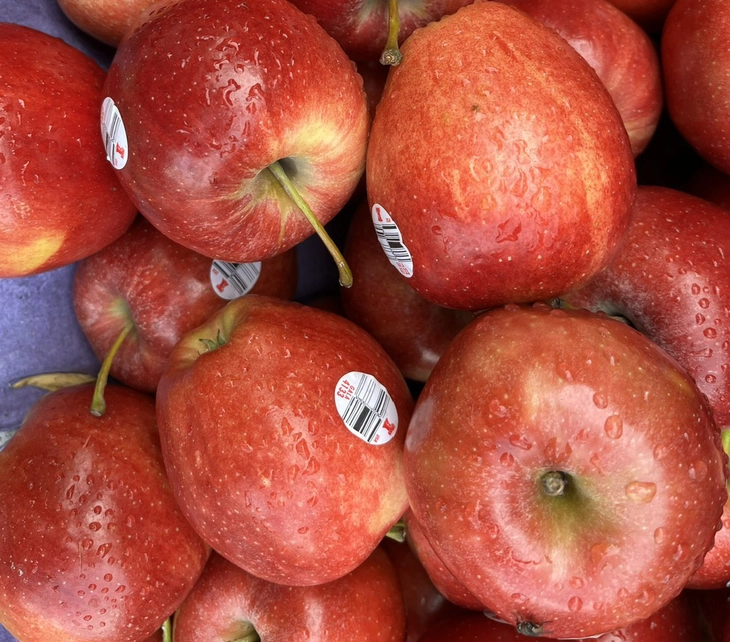
Apples are one of the fruits that contain a lot of fiber - Photo: TTO
Fiber plays a role in feeding beneficial bacteria in the gut, helping to maintain regular bowel movements, supporting weight control and protecting against chronic diseases such as diabetes, heart disease and colon cancer.
How does fiber affect bowel movements?
Fiber plays an important role in maintaining a healthy digestive system and helping bowel movements run smoothly. Getting enough fiber in your diet can help prevent bowel movement problems such as constipation or diarrhea.
The body does not completely digest fiber. In the digestive tract, fiber absorbs water, making stools larger, softer, and easier to pass, making bowel movements easier and less painful.
Fiber also helps waste move smoothly through your digestive tract. This is important to ensure you have regular bowel movements (usually more than three times a week, depending on a variety of factors).
Benefits of fiber for the digestive system
Fiber brings many benefits to the digestive system in particular and the body's health in general:
Prevents constipation and diarrhea: Supports a healthy digestive system: fiber helps remove unnecessary buildup in the digestive tract, improves gut health and potentially reduces the risk of developing colon cancer.
Supports an optimal gut microbiota environment : Fiber helps promote the growth of beneficial bacteria in the gut, creating compounds called short-chain fatty acids (SCFAs). SCFAs help protect the gut lining, reduce inflammation, and strengthen the intestinal barrier, contributing to maintaining a healthy digestive system.
Maintains satiety and aids weight control : Because fiber is not fully digested, it moves slowly through the digestive tract. This helps you feel fuller for longer, which can aid in weight control .
In addition to digestive benefits, a high-fiber diet has been shown to help prevent the risk of diseases such as heart disease, diabetes, obesity, and colon cancer.
For example, eating enough fiber can help lower low-density lipoprotein (LDL, or "bad" cholesterol) and aid in blood sugar control in people with type 2 diabetes.
Recommended Daily Fiber Intake
The recommended daily intake of fiber is approximately 22-28g for adult women and 28-34g for adult men. Fiber needs may vary depending on age and health status.
As a general guideline, experts recommend that people consume 14 grams of fiber for every 1,000 calories of food eaten. A person consuming about 2,000 calories a day should aim to eat about 28 grams of fiber a day.
Each food contains different amounts of fiber, such as split peas 8.3g fiber/100g beans; broccoli 2.6g/100g; carrots 2.8g/100g; bananas 2.6g/100g; apples 2.4g/100g...

Broccoli (2.6g fiber/100g) grilled with butter and lemon juice - Photo: Bobbi Lin
Tips for adding fiber to your diet
Adding more fiber to your diet doesn’t have to be complicated. Here are some practical tips to help you increase your daily fiber intake:
Load up on fruits, vegetables, nuts and seeds: Between meals, choose fiber-rich snacks like avocados, apples, pears, baby carrots, sunflower seeds and almonds.
Choose non-starchy vegetables: To add extra fiber, include a salad with lunch or add vegetables to dinner.
Boost Beans and Legumes: Beans, lentils, and peas are high-fiber foods that are easy to add to soups, stews, baked goods, salads, or homemade dips.
Combine different sources of fiber: Try to eat both insoluble fiber (e.g., cereals, whole grains, wheat) and soluble fiber (e.g., fruits, oats, bran, vegetables). Diversifying your fiber sources helps support digestion and overall health.
Maintain a steady daily fiber intake: If you travel frequently, eat out a lot, or have difficulty getting enough fiber through your diet, consider talking to your doctor about taking a fiber supplement.
Source: https://tuoitre.vn/chat-xo-quan-trong-the-nao-ma-cac-me-lai-phai-them-keo-rau-cu-cho-con-20250314081424355.htm







































Comment (0)